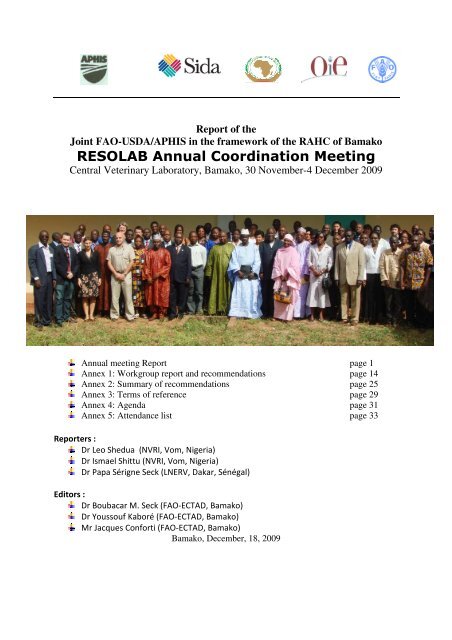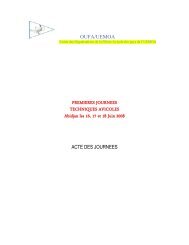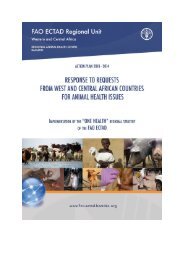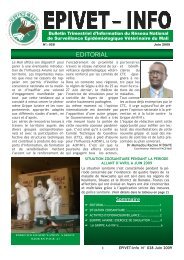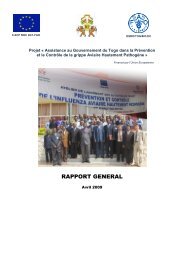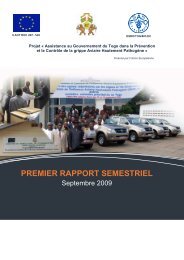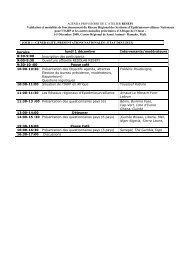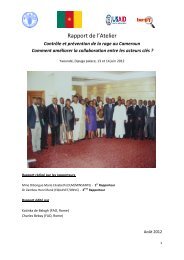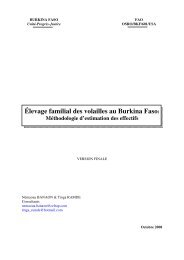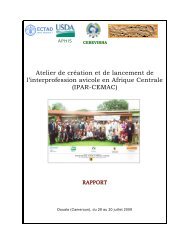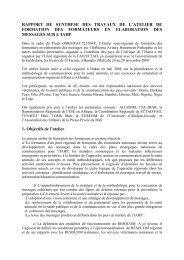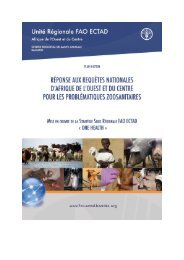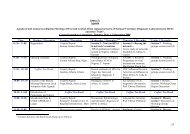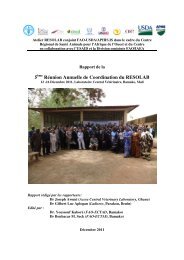RESOLAB Annual Coordination Meeting - fao ectad bamako
RESOLAB Annual Coordination Meeting - fao ectad bamako
RESOLAB Annual Coordination Meeting - fao ectad bamako
You also want an ePaper? Increase the reach of your titles
YUMPU automatically turns print PDFs into web optimized ePapers that Google loves.
<strong>RESOLAB</strong> action plans over the years have benefited immensely from internationalpartners, but however encouraged member states to take ownership of <strong>RESOLAB</strong>.The guest of honour Dr. Mamadou Kane, Secretary General of the Ministry of Livestock andFisheries, Mali on behalf of the Minister, thanked organisers of the meeting for choosingBamako as the host. He noted that <strong>RESOLAB</strong> was set up for avian influenza (AI) but cansatisfactorily play a role in the control of other Transboundary Animal Diseases (TADs). Heexpressed gratitude to USAID, USDA-APHIS, FAO, OIE, AU-IBAR for their continuoussupport to <strong>RESOLAB</strong> and with this he declared the meeting officially opened.The second session of the day started with presentation of the objectives of the 2009meeting by the <strong>RESOLAB</strong> coordinator, Dr. B. M. Seck who stated that the <strong>RESOLAB</strong> meetingtends to see the possible ways to increase technical support to national labs and to assumethe viability and sustainability of <strong>RESOLAB</strong>. He stated that the general objective of this year<strong>RESOLAB</strong> meeting was aimed at assessing the progress achieved by member labs and settargets for the near future. He enumerated the specific objectives as follows:Review of national laboratories diagnostic activities in 2009Review of regional laboratories LNERV-Dakar and NVRI-Vom activitiesResponses to 2008 <strong>Annual</strong> <strong>Coordination</strong> <strong>Meeting</strong> recommendationsReport on <strong>RESOLAB</strong> network coordination activities andThe expected outcome of the meeting he emphasised shall be directed towards having acommon view and strong commitment of member states on the:Networked labs main activitiesNetwork coordination activitiesHow to improve Governments 'support to their national labsHow to improve <strong>RESOLAB</strong> visibility and sustainabilityAction Plan Outlines for 2010 and main targets for near future.After the presentation, the Chairman Dr. (Mrs) L.H. Lombin acknowledged him for a jobwell-done. In regards the issue of sustainability, she pointed out the need to know theprogress made from the previous annual meeting recommendations as this will guide thegroup on how to identify what to sustain and how to go about it.The next presentation was on USDA/APHIS activities in West and Central Africa to supportrapid detection and early response for HPAI by Dr. L.Logan. She highlighted the2
involvement of her office in the fight against Avian Influenza in Africa. This was showcasedby the different activities APHIS carried out in 2009 in terms of poultry diseases diagnostictraining, elaboration of field tools for HPAI control, involvement in field simulationexercise. She ended her presentation by listing the USDA/APHIS activities earmarked for2010. In conclusion, she pointed out the fact that HPAI is not being reported presently inAfrica and also there is little ongoing HPAI surveillance. Thus, it remains unknown whetheror not the virus is still circulating in Africa. She stressed the need for collaboration betweenthe epidemiology and laboratory networks to be able to predict future occurrences ofoutbreaks. In response to the presentation, a question was asked whether USDA/APHISsupports funding for HPAI in the human inter-phase. She replied that APHIS is not afunding agency but gives technical support. It was suggested that APHIS should use itsoffices to facilitate collaboration between African labs and the Veterinary institutions inthe USA.The “Notes on second annual meeting recommendations” were presented by Dr. Seck. Hehighlighted the roles assigned to:National Veterinary Diagnosis laboratories of the networkBamako Regional animal health centre (RAHC)Regional laboratoriesNetwork’s Member StatesSub-regional organizations and international donorsInternational Reference Laboratoriesin order to strengthen national laboratories and to achieve their network viability andsustainability.Dr. Seck, in another presentation, gave a review of the network‘s coordination 2009activities. He highlighted the fact that <strong>RESOLAB</strong> is not only concerned with Avian Influenzacontrol but also all the transboundary Animal Diseases and Zoonosis. Based on this needthe previous annual meeting recommended the following results oriented efforts: -Consolidate the network by pursuing advocacy amongst the member stategovernmentsOrganization of workshops with different partners such as FVI, STOP-AI,USDA/APHIS, OIE;Conduction of inter-laboratory proficiency tests.3
Dr. Seck mentioned that a sum of 380 000 US Dollars was used to support laboratoryequipments supply in member counties; the collaboration between <strong>RESOLAB</strong> and RESEPIwas effective. However, the <strong>RESOLAB</strong> coordination noted the weak support from manymember state governments to their national labs, this was highlighted in instances such asa aging staff having no replacement. The problem of weak collaboration betweenepidemiologic staff and diagnostic laboratory has also been pointed out. He stressed theneed for consolidation and sustainability of the network in terms of institutionalarrangement within the region to assume the ownership of the network. Thisrecommendation was also highlighted in the ALive feasibility study report for laboratorynetworks in sub Saharan Africa. In response to his presentation, Dr. Giovanni Cattoli fromPadova, highlighted the issue of how to source for fund for the sustainability of the<strong>RESOLAB</strong>. Dr. Seck was applauded for a job well done.Update on National Laboratory Diagnostic activities were taken from Benin, Burkina Faso,Cape Verde, Central Africa republic, Cote D’Ivoire, Gabon, DRC, Congo, Gambia and Ghana.DAY 2 REPORT , Tuesday December 1, 2009The second day presentation update on National Laboratory Diagnostic activities weretaken from:Guinea Conakry by Dr. Souleymane DialloGuinea Bissau by Drs. Maria Henriqueta VieiraLiberia by Mr. Salomon BrowneTchad by Mr. Assandi OussiguereCameroun by Dr. Andre NgangnouNíger by Dr. Gamatie DjiboSierra Leone by Dr. Mohamed BarrieTogo by Mr. Awoume KodzoMali by Dr. Saidou TembelySenegal by Mrs. Fatou TallNigeria by Dr. Tony JoannisThe representatives of Sao Tome and Principe and Equatorial Guinea could not reachBamako on time.4
DAY 3 REPORT Wednesday December 2, 20091. Introduction of Sao Tome and Principe representative (Dr. Joseldo A. Afonso) alongwith FAO, Gabon representative (Dr. Abdurahman Hassan) and USAID RegionalOffice in Accra, Ghana representative (Dr. Baba Soumare).2. Day 2 summary by reporters3. ErrataIt was observed that the reason why suspected colibacillosis samples sent toReference Laboratory in France from Guinea Conakry was not given in the report.The reason given for the shipment of the suspected sample was based on therequest by the client.The corrective measures to be taken to address the problem of skilled qualifiedpersonnel, maintaining such staff and readily available replacement for aging andretired staff was not reflected. Staff motivation, passion for work and recruitmentof experienced dedicated staff were proposed as corrective measures.4. Presentations of the day:The following topics were presented and discussed:General Guidelines on epidemiological surveillance in Animal Health by Dr. MarcoDe NardiUpdate on new NDV genotypes circulating in the West/Central Africa and theimplication for its diagnosis and control by Dr. Giovanni CattoliTechnical capacity building: Lessons learnt from Dakar and Douala quality assurance(QA) workshops by Dr. Joel GodenirLessons learnt from Accra QA workshop by Prof. J. SalikiComments, Questions and responses taken after the presentations include:The need to have both field epidemiologist and lab personnel come togetherfor proper training at country lab level on epidemio-surveillance system inorder to have full comprehension of the subject matter was emphasized.The need to have surveillance protocols developed for sampling beforecommencement of any project was emphasized and the epidemiologist7
should be charged to be responsible for this but should share idea with thelab personnel.Isolation of novel genotype 7 with 4 sublineages was reported to becirculating in backyard poultry of West and Central Africa by Dr. Cattoli.Virus isolation was discovered to be more sensitive for the detection of thisgenotype compared to real time RT-PCR due to mutation in the HN and Fgene. The real time RT-PCR assay protocol has thus been modified to detectall genotypes.Newcastle Disease Virus vaccine failure was identified as serious problem inpoultry production system by member states. The <strong>RESOLAB</strong> was urged tocome up with modalities to address this problem in conjunction with NDVvaccine producing member countries, PANVAC and reference laboratory tofind solution based on the report of the new genotype.It was observed that the quality of the NDV vaccines used in the field insome instances may be okay but the storage, transport and wrongadministration could be responsible for some purported failure of thevaccine on the field.Based on the report of the circulation of new genotype NDV, membercountries were urged to intensify surveillance at country and network levelto identify other circulating genotype (if any) in the sub region.Use of Haemagglutination-Inhibition (HI) test for ND diagnosis as stated insome member countries presentation was brought to fore. It was clarifiedthat use of such diagnostic technique for confirmation especially for serasamples is not satisfactory. It was also mentioned that HI can not be used todistinguish between virulent and non-virulent strains of NDV. Membercountries should therefore take note.It was mentioned that USDA-APHIS has a NDV vaccination project in thepipeline for Africa countries.<strong>RESOLAB</strong> Member countries were encouraged to use the training acquiredfrom AI projects to consolidate on addressing other poultry diseases egGumboro disease, etcThe lesson learnt from the QA workshops held in Dakar and Douala for the18 <strong>RESOLAB</strong> French speaking countries and Accra for the 5 <strong>RESOLAB</strong> Englishspeaking countries emphasized the need to be steadfast on their qualitymanagement system (QMS) implementation pursuit as there is still more8
work to be done bearing in mind that it is a an unending journey that isachievable for all.Member countries were encouraged to work assiduously towards beingaccredited for ISO 17025After lunchThe following topics were presented and discussed:The Second International Proficiency Test for AI and ND by Dr. Rafaella NisiThe global express: International trade and animal health by Prof. CorrieBrownOverview of the national animal health laboratory network (NAHLN) by Dr.Barbara Martin.Comments, Questions and responses taken after the presentations include:The 2008 results of the International Proficiency Test for AI and ND for the<strong>RESOLAB</strong> member countries that participated was helpful, revealing somegaps and weaknesses for some laboratories.<strong>RESOLAB</strong> member countries that excelled were congratulated while thosethat did not perform well were encouraged to troubleshoot the cause oftheir failure and use it as spring board to excel in subsequent test.Train the trainers method should be adopted to strengthen the <strong>RESOLAB</strong>network.DAY 4 REPORT, Thursday, December 2, 20091. Summary of day 32. Introduction of the OIE representative for Africa, Dr Abdoulaye Bouna Niang andthe AU-IBAR representative for West and Central Africa, Dr. Zacharia Compaore.3. Comments and corrections:The false negativity of the ND r RT-PCR was noted to be due to mutation of in theMatrix (M) gene and not the HN and the F genes as previously reported.9
Issue of low sample submission for analysis was highlighted. Heads of laboratorieswere therefore admonished to make conscious effort to encourage samplesubmission.Train the trainer method should be adopted for capacity building across the<strong>RESOLAB</strong> network.Laboratories were encouraged to take part in collaborative research as this willimpact positively on laboratory throughput.Member states were urged to institutionalize and take ownership of the <strong>RESOLAB</strong>Network.The next line of action of the Alive study was demanded by the assembly.This was preceded by the requirement regarding the significance of ALive acronymwhich is “Partnership for Africa Livestock Development, Poverty Alleviation andSustainable Growth in Africa”, a project initiated by the WBProvision of ultra-low freezers to laboratories that have stable power supply butwith weak diagnostic capacity to enable them collect and properly store samplesfor submission to laboratories with better diagnostic capacity.Promoting, strengthening and sustaining public health and veterinary laboratoryNetwork was highly emphasized. And it was recognized that the example of SACIDS(Southern Africa Centre for Infectious Diseases Surveillance) is a good forum fortargeting such collaboration5. Presentation of the day (continued)The following topics were presented and discussed:Experiences of AU-IBAR Laboratory Networks by Dr. Zacharia Compaore, AU-IBARSPINAP-AHI project regional coordinator. His second presentation was on SPINAP-AHI project explained and other activities of AU-IBAR.Experiences of OIE Laboratory Networks by Dr. Abdoulaye Bouna Niang, OIERegional representative for Africa. He detailed the OIE PVS tool and Gap Analysismechanism. He underlined the challenges in getting accreditation of Africancountries veterinary laboratories. He noticed that, according to OIE, VeterinaryServices encompass all components of animal health including diagnosticlaboratory. He highlighted the OIE lab twining project that could be beneficial forAfrican countries.Discussions, comments and questions:11
Some member countries (labs responsible) stated that they even don’t know aboutSPINAP-AHI, or were not informed about the funding given to the country bySPINAP-AHI. While other countries confirmed their awareness about the SPINAP-AHI fund received in their countries for the lab component.The lack of information about SPINAP-AHI project within the different animal healthactors in the country is not due to SPINAP-AHI coordination but it’s an internproblem of the country itselfRegarding the management of the fund received from SPINAP-AHI project in thecountry, there is some control mechanisms putted in place by the SPINAP-AHIcoordination. It was pointed out that there is a deadline for a country to use thefunds allocated by SPINAP-AHI, if not the fund will be returned to SPINAP-AHIcoordination for re-allocation to other countries;It was highlighted that in the SPINAP-AHI funding there is a specific budget line forlaboratories ;It was pointed out that in the dossier of laboratories equipment there is an existingcollaboration between the coordination of SPINAP-AHI and <strong>RESOLAB</strong>. <strong>RESOLAB</strong>coordination provided a list of laboratory equipments needs for its membercountries to the SPINAP-AHI coordinationRegarding the durability of SPINAP-AHI, it was highlighted that SPINAP-AHI is anemergency project, borne with the occurrence of AI and will finished in 2010.In regard with the OIE reference laboratories or collaborating centres, it waspointed out there is none in Africa at least for zoonotic diseases and membercountries should develop strong advocacy and capacities building to reach thistarget.Some clarifications were required about the OIE procedures on laboratories twiningproject. It was pointed out that each CVO can apply for that, especially countriesthat have already undergone PVS and gap analysis missions.After lunchThe Group works session started with 3 groups and for each group a major themewas to be discussed:Group 1: <strong>RESOLAB</strong> institutional and financial sustainabilityGroup 2: <strong>RESOLAB</strong> operation and visibilityGroup 2: Improvement of national veterinary technical capacity.12
DAY 5 Report, Friday, December 4, 2009The first part of the fifth day was dedicated to group work sessions. Then group discussionreports were discussed, amended and adopted during plenary session. The last part of theday and the closing ceremony were chaired by Dr. Mulumba who thank all participants fortheir active participation and the Central Veterinary Laboratory and Mali for hosting themeeting. The meeting closing speech was delivered by Dr. Saidou Tembely, Director of theCentral Veterinary Laboratory of Mali, on behalf of the Ministry of Livestock and Fisheriesof Mali.------------------------------------13
ANNEX 1 : WORK GROUP REPORTS AND RECOMMENDATIONSWork Group 1.Theme: <strong>RESOLAB</strong> institutional and financial sustainabilitySituation: <strong>RESOLAB</strong> is currently funded 100% by international organizations. This is not asustainable situation.Observations:1. <strong>RESOLAB</strong> long term viability is in jeopardy if foreign funding declines or disappears.2. Experience from SADC network shows that much progress can be made when theregional economic community owns and runs the laboratory network.3. <strong>RESOLAB</strong> membership covers two economic blocks – ECOWAS and CEMAC.4. Most labs lack adequate funding for routine operations; several labs do not have anindependent budget.5. Most laboratories have no fee income from diagnostic services rendered.Goals:1. Regional laboratory network owned and funded by economic block.2. National labs better funded by national governments.Objectives:1) Assure <strong>RESOLAB</strong> ownership by regional economic community.2) Decentralization of <strong>RESOLAB</strong> according to the economic blocks?3) Alternative funding mechanisms.Explore ways of generating laboratory fee income by increasing sample submissions to laband institutionalizing fees for diagnostic services.Terms of reference:1. Institutionalization:• Map out strategy to assure <strong>RESOLAB</strong> ownership by ECOWAS within 2 years.o Steering committeeo Advocacy group• Consider splitting <strong>RESOLAB</strong> along economic community lines.2. Funding:• Secure funding for <strong>RESOLAB</strong> from ECOWAS.14
• Explore ways of generating laboratory fee income by increasing sample submissionsto lab and institutionalizing fees for diagnostic services.Group Composition:President: Kodzo Awounè (Togo)Vice-President: Borrie Jabang (Gambia)Rapporteur: Hassan Abdourahamane (FAO - SFC - Libreville)Members:Luc Aplogan (Benin)Aminata B. Djibo (Niger)André Ngagnou (Cameroun)Opokou Pare (Ghana)Sylvain Enkoro (Gabon)Mahamat Hamid (Tchad)Mondo Moundoumou Placide (Gabon)Tesfai Tseggai (FAO – ECTAD – Abuja)Maria Henriqueta R. Vieira (Guinée Bisseau) Cyrille Loungouedi (Congo)Work Group 1 ReportPreamble:• Considering the fact that the network of laboratories can not be indefinitely financed byexternal sources,• Considering the fact that SADC experience shows that a lot of progress can be made if theregional economic community ensure the network ownership and support it,• Considering the current situation where most of labs lack of adequate funding for routineoperations, because they do not have no autonomous budget,• Considering the decentralization process agreed by FAO;• Considering the ownership of this process by the Regional Economic Communities (RECs) inSouthern and Eastern Africa in supporting laboratories network,• Considering the existence of Regional Animal Health Centres and regional laboratories inthese areas,We recommend:Institutional Aspects• To Central Africa Economic Community of Central Africa States (CEEAC) and to theEconomic and Monetary Community of Central Africa (CEMAC) :Establish a Regional Animal Health Centre in Central Africa;Select a regional reference laboratory in Central Africa.15
• To <strong>RESOLAB</strong>The <strong>RESOLAB</strong> advocacy Committee, with the support of FAO, to convince governments and RegionalEconomics Community decisions makers to undertake visit into each country for the theinstitutionalization of <strong>RESOLAB</strong> for:Including <strong>RESOLAB</strong> into regional economic institutions;Change in the status of national and regional laboratories in order to empower them visà-visof the veterinary services (in terms of financial resources);Sensitizing governments to adequately fund national veterinary diagnostic laboratories.• To Laboratories DirectorsBring the <strong>RESOLAB</strong> institutionalization project by their Ministry.Potential sources of funding• For National Labs1. Apply fees for diagnostic services;2. Struggle for a specific budget line into the national budget;3. Get funds through multisectoral projects and / or research programs;4. Mobilize own generated funds (e.g vaccine production);5. Establish partnerships with private sector;6. Levy taxes on veterinary services for Labs;7. Establish partnerships with outside labs in the transfer of expertise and funds mobilization;8. Undertake research and development activities;9. Explore collaborative opportunity with public health in looking for funding.• For <strong>RESOLAB</strong>10. Obtain funding from the RECs, African Union, OIE and other international institutions.16
Work Group 2Theme: <strong>RESOLAB</strong> Operation and visibilitySituation: The <strong>RESOLAB</strong>, though successful in many regards, remains relatively invisible tonational, regional, and international institutions.Observations:1. The growth and consolidation of <strong>RESOLAB</strong> over the past 3 years is barely knownbeyond the network’s membership.2. Increased visibility would help the network secure funding from national , regionaland international authorities.3. There has been a lack of collaboration between <strong>RESOLAB</strong> and other veterinary andpublic health laboratory networks.Goal: Improved publicity of network activities and collaborative activities with otherAfrican networks.Objectives:1) To improve the dissemination of information from <strong>RESOLAB</strong> to member labs anddevelopment partners.2) To initiate collaborative activities with African veterinary and public health networks.Terms of reference:1. Propose a strategy for publicizing <strong>RESOLAB</strong> activities:• Newsletter• Expansion of e-mail lists to include international partners.• <strong>Annual</strong> report of activities• Directory of <strong>RESOLAB</strong> members• Scientific conferences3. Propose collaborative activities with other African laboratory networks(SADC, EALN), RESPEPI, and public health networks.Group Composition:President: Dr. Ouattara Lassina (BURKINA FASO)Vice President: Dr. Gwéha Roosevelt (LIBERIA)Rapporteur: Dr. L. Minoungou Germaine (BURKINA FASO)17
Members:Domitien G. Mokondji, RCALouise Achi Atse, Cote d'IvoireRoosevelt G. Gwéha, LiberiaOusmane M. Diop, IP SenegalLamidi Kakpo, BéninMohamed Barrie, Sierra LeoneCorrie Brown, UGA, USA (USDA)Sylla Djénéba Sy, MaliRamadan Mr. Diallo, GuineaEddie K. Bapoledi, Botswana (SADC)Rafaella Nisi, Italy IZSVeGamatiè DJIBO, NigerOussigueré Assandé, TchadBoubacar Seck; Bamako (FAO)Mamadou Racine N'DIAYE, MaliLassina Ouattara, Burkina FasoGermaine L. Minoungou, Burkina FasoMagnoudéeva PALI, TogoGroup 2 Report1. Strategy for promoting <strong>RESOLAB</strong> activitiesBefore entering the heart of the matter, it was noted a lack of dynamic, regular and formalexchanges within the <strong>RESOLAB</strong> itself, as witnessed by low reporting of national labsactivities to the network coordination.For each level of intervention:Identify partners and draw up their list;Define the support, nature and channels of information dissemination;Define the frequency of information dissemination.• National LaboratoriesEnable transmission of quarterly reports to make available the informationwhich will form a database for summary reports and advocacy activities.Produce periodic summary reports to be shared with national partners andused for the preparation of quarterly reports.Sensitize group of parliamentarians in charge of economic issues onnational laboratories and <strong>RESOLAB</strong> activities.Contribute regularly to thematic groups.18
• <strong>RESOLAB</strong> <strong>Coordination</strong>- Within the <strong>RESOLAB</strong>Create a mailing group within the network to improve communication,encourage exchanges between network members on cases of diseasesdiagnosed in a member country, new methods of diagnosis, relevantinformation sites to visit, on a weekly basis.Summarize information exchanged on the site for a monthly distributionamong network members, other networks and potential partners.Create thematic groups, after a certain period of time, to share specificinformation.Summarize information by themes, <strong>RESOLAB</strong> activities, achievements andprogress made by various laboratories, animal health status in membercountry etc... to be released at specified intervals ofr time to other networksand partners.- Outside the <strong>RESOLAB</strong>:Identify partners to be informed on network activities and strategiesdeveloped for its sustainability.Organize advocacy activities for mobilization of human, material andfinancial resources.Ensure visibility of <strong>RESOLAB</strong> and its members by identified partners.2. Initiate collaborative activities with other laboratory networks African RESPEPI andpublic health networks• Regarding RESPEPI and RESOCOMThe epidemiological surveillance networks and national labs define together each countrypriority diseases. Therefore epi surveillance networks influence the activity of thelaboratory, and it would be wise to involve them in debates and discussions onlaboratories issues for improving visibility of <strong>RESOLAB</strong> activities and results.Associate RESEPI and RESOCOM to <strong>RESOLAB</strong> meetings;• With regard to public health networksIdentify focal points dealing with zoonotic diseases within public healthdepartments to be direct correspondents for various activities (of19
<strong>RESOLAB</strong>). This will facilitate information exchange between variousstakeholders; improve communication and planning of collaborativeactivities.It is also recommended to identify cross-cutting themes (quality assurance,metrology, biosecurity, specimens packaging and shipment ...) for trainingand seminars for the various partners.Strengthen exchanges between networks at national level.• Other laboratory networks in AfricaInclude such networks in the <strong>RESOLAB</strong> mailing list for informationdissemination.Promote exchanges for harmonizing common issues such as transboundarydiseases control and food safety.Organize inter- networks joint meetings.Recommendations:1. Within each country, formalize the designation of focal points for zoonoticdiseases with public health and animal health departments and involvethem into collaborative activities2. Identify laboratories and institutions of public health and animal healthdepartments to facilitate collaboration and agreements between them.3. Encourage meetings between <strong>RESOLAB</strong> members’ countries on thematicgroups (eg monograph of transboundary diseases).-------------------------20
Work Group 3THEME: ENHANCING THE TECHNICAL CAPACITY OF NATIONAL VETERINARY LABORATORIESSituation: Most <strong>RESOLAB</strong> members indicated that lack of adequate personnel training is amajor constraint to enhanced testing capacity and quality assurance.Observations:1. The quality assurance score card for 2009 shows that most <strong>RESOLAB</strong> member labsare still a long way from establishing a QA program.2. All laboratories listed inadequate personnel training as a major constraint.3. Most labs handle very small sample numbers and poor sample quality is a problem.Low sample numbers hamper the performance of tests with good quality and atreasonable cost.Goal: Enhanced laboratory testing capacityObjectives:1) Improvement of laboratory testing through implementation of quality assurance2) Improvement of personnel technical capability3) Improvement of the quality and quantity of samples received in laboratories.Tasks:1. Quality assurance: define achievable goals for 2010• QA implementation road map and action plan (bottom line for all labs)• Documentation plan (targets)• Local solution for metrology, equipment maintenance/calibration2. Technical capacity building• Explore twinning with accredited labs to enhance technical capacity building• Explore train the trainer program3. Improved synergy between laboratory and field personnel.• Common training for lab personnel and field vets• Training of field vets in the suitable collection and shipment of samples.Group Composition:President: Dr. Leopold MulumbaVice-President: Kebba Daffeh21
Rapporteur: Fatou TallMembers:Kassoum Samaké (LCV / Mali)Dounia Bruno (LACAVET/ RCA)Go -Maro Emilie (LCV/Togo)Danho Thérése (LANADA/Cote d’Ivoire)Fernandez Joseldo (LNDV/Sao Tomé)Santos Francisca (Lab Vet/Cap-vert)Correia Apia Nunes (LNV/Guinée Bissau)Souleymane Diallo (LCVD/Guinée Conakry)Evora Maria (Lab vet/Cap vert)Samba Nganga Eugenie (Congo Braza)Boniforce Lombe Pongombo (Congo)Abdoul kadiri Souley (LANAVET/Cameroun)Joel G odenir (FVI, FranceWork group 3 reportINTRODUCTIONOn the basis of country reports data at the <strong>RESOLAB</strong> annual workshop organized, 30November to 04 December 2009 in Bamako, we pinpointed the need to improve thetechnical capacity of national veterinary laboratories for the following reasons: lack ofadequate training, appropriate equipment, supplies, infrastructure, budget, staffing, andlow national government involvement so as to improve the work quality. Therefore:1. Considering the importance of establishing a quality assurance system as an essential step;2. Considering the importance of the training of technical personnel involved in the performance ofassays and other laboratory works;3. Given the need to initiate/improve synergies between laboratory technical staff and fieldinvestigations staff;4. Given our common needs with regard to equipment maintenance and calibration;5. Given the low volume and quality of samples received by laboratories.We recommend:• To National Laboratories With regard to quality assurance, all the network’s laboratories should:Have a quality assurance policy approved and validated by a competent authority;Initiate and make mandatory good laboratory practices use in short period of time;Apply the rules of facilities management: rooms identification, cleaning,disinfection;22
Write a procedure for the management of facilities, personnel, equipment,methods, reagents and samples (details will be posted <strong>RESOLAB</strong> website);Write all the standard operating procedures (SOPs);Establish a comprehensive plan of quality system document drafting;Produce equipment maintenance plan for equipment that may be maintained bythe laboratory and locally;Identify and establish a dossier for each critical equipment;Train a team of internal auditors;Start as soon as possible the drafting of quality manual;Designate a person responsible for maintenance and explore the possibility ofcollaboration with public health laboratories;Encourage collaboration between veterinary and public health services in the fieldof zoonotic diseases;Use as much as possible regional laboratories for testing of samples that could helpto improve their visibility and performance. With regard to technical staff training:Identify training needs;Identify sponsors and contact them;Ensure trainers training;Ensure staff stability by motivation;Get a signed commitment from candidates applying for training; On synergies between technical staff and the laboratory involved in field Iinvestigations:Encourage collaboration between laboratory services and field epidemiosurveillance teams,private veterinarians, farmers for sample collection in order to increase quantity and qualityof samples processed by laboratories;Organize awareness sessions for all aforementioned stakeholders so as to improve diseasesurveillance;Initiate research projects focused on countries priority diseases which could allow provisionof equipment and consumables and training grants. Regarding government involvement:Initiate concrete actions to get substantial involvement and especially financialsupport;23
• To the Regional Animal Health CentreSupport the establishment of a regional quality assurance program;Promote the training of personnel involved in the network;Facilitate regular supply of consumables;Assist national laboratories in their effort for achieving equipment maintenance andcalibration;Initiate diagnostic techniques harmonization between laboratories and continue toorganize inter-laboratory proficiency tests;Continue to encourage synergistic work between epidemiology network andlaboratory network as well as with other stakeholders;Provide technical expertise to the network;Propose a standardized protocol for animal diseases surveillance and control;Support research projects initiated and submitted by the laboratories;Follow-up on implementation steps;Organize the network annual coordination meeting.• To the two regional laboratoriesStrengthen technical capacity and monitoring of regional laboratories;Provide support in new disease outbreaks management;Return back the results of laboratory analysis to laboratory senders.• To Member StatesTake in charge water, electricity, salaries, staff motivation costs as well as infrastructure.Begin the process to sensitize regional organizations in order to make them see the impactrelated to animal diseases and therefore to the economyAllocate a specific budget from all livestock development projects for epidemiosurveillanceand laboratory.• To Subregional organizations, international and other donorsProvide substantial support to national laboratories, regional laboratories and to RegionalAnimal Health Centre.• To International Reference LaboratoriesProvide technical assistance to national and regional laboratories;Continue to assist personnel training;Facilitate laboratories twinning.------------------------------24
To National LaboratoriesOn Institutional AspectsAnnex 2: Summary of Recommendations30 November – 1 December, LCV, Bamako, Mali.Bring the <strong>RESOLAB</strong> institutionalization project by their Ministry.On resources mobilizationMobilize own generated funds (e.g vaccine production, cost recovery for services, public –private partnership …) ;Get funds through multisectoral projects and / or research programs;Sensitize group of parliamentarians in charge of economic issues on national laboratoriesand <strong>RESOLAB</strong> activities.Establish partnerships with private sector;Explore collaborative opportunity with public health in looking for funding.Struggle for <strong>RESOLAB</strong> funding by Regional Economic Communities (RECs), African Union, OIEand other international organizations.On capacity building and especially on personnel trainingIdentify training needs and sponsors and contact them;Establish partnerships with foreign laboratories in technology transfer and fundsmobilization;Ensure staff stability by providing fair incomes and training;Include research and development activities into lab programs;Contribute regularly to thematic groups.Ensure trainers training;On cooperation with <strong>RESOLAB</strong>, regional laboratories and public health laboratoriesEnable transmission of quarterly reports to make available the information whichwill form a database for summary reports and advocacy activities.Produce periodic summary reports to be shared with national partners and used for thepreparation of quarterly reports.Encourage collaboration between veterinary and public health services in the fieldof zoonotic diseases and identify focal points.On quality assurance systemStart implementing Dakar, Douala and Accra Quality Assurance workshopsrecommendations ;Have a quality assurance policy approved and validated by a competent authority;25
Start with Quality Manual drafting ;Write a procedure for the management of facilities, personnel, equipment,methods, reagents and samples (details will be posted <strong>RESOLAB</strong> website);Designate a person responsible for maintenance and explore the possibility ofcollaboration with public health laboratories;Use as much as possible regional laboratories for testing of samples thatcould help to improve their visibility and performance.On improvement of synergy between laboratory and fieldEncourage collaboration between laboratory services and field epidemiosurveillance teams,private veterinarians, farmers for sample collection in order to increase quantity and qualityof samples processed by laboratories;Create awareness among all aforementioned stakeholders so as to improve diseasesurveillance;Initiate research projects focused on countries priority diseases which could allow provisionof equipment and consumables and training grants.To Regional LaboratoriesStrengthen technical capacity and monitoring of regional laboratories;Provide support in new disease outbreaks management;Return back the results of laboratory analysis to laboratory senders.To <strong>RESOLAB</strong> <strong>Coordination</strong>Institutional aspectEstablish an advocacy Committee, with the support of FAO, for <strong>RESOLAB</strong>institutionalization within RECs;Including <strong>RESOLAB</strong> into regional economic institutions;On resources mobilizationOrganize advocacy activities for mobilization of human, material and financial resourcesby RECs, African Union and other international organizations.Support Change in the status of national and regional laboratories in order to empowerthem vis-à-vis of the veterinary services (in terms of financial resources);Sensitizing governments to adequately fund national veterinary diagnostic laboratories.On network DynamicsCreate a mailing group within the network to improve communication, encourageexchanges between network members on cases of diseases diagnosed in a membercountry, new methods of diagnosis, relevant information sites to visit, on a weekly basis.26
Summarize information exchanged on the site for a monthly distribution among networkmembers, other networks and potential partners.Create thematic groups, after a certain period of time, to share specific information.Include other networks in the <strong>RESOLAB</strong> mailing list for information dissemination.Summarize information by themes, <strong>RESOLAB</strong> activities, achievements and progress madeby various laboratories, animal health status in member country etc... to be released atspecified intervals of time to other networks and partners.On relation with other veterinary networks and public health networksIdentify partners to be informed on network activities and strategies developedfor its sustainability.Ensure visibility of <strong>RESOLAB</strong> and its members by identified partners.Associate RESEPI and RESOCOM to <strong>RESOLAB</strong> meetings;Identify laboratories and institutions of public health and animal health departments tofacilitate collaboration and agreements between them.Organize inter- networks joint meetings.Identify cross-cutting themes (quality assurance, metrology, biosecurity, specimenspackaging and shipment ...) for training and seminars for the various partners.On national laboratories capacity buildingEncourage meetings between <strong>RESOLAB</strong> members’ countries on thematic groups (egmonograph of transboundary diseases).Support the establishment of a regional quality assurance program;Promote the training of personnel involved in the network and regular supply ofconsumables;Assist national laboratories in their effort for achieving equipment maintenance andcalibration;Initiate diagnostic techniques harmonization between laboratories and continue toorganize inter-laboratory proficiency tests;Provide technical expertise to the network;Propose a standardized protocol for animal diseases surveillance and control;Support research projects initiated and submitted by the laboratories;Organize the network annual coordination meeting.To International Reference laboratoriesProvide technical assistance to national and regional laboratories;Continue to assist personnel training;27
Facilitate laboratories twinning.To Member StatesFormalize the designation of focal points for zoonotic diseases with public healthand animal health departments and involve them into collaborative activitiesTake in charge water, electricity, salaries, staff motivation costs as well as infrastructure.Begin the process to sensitize regional organizations in order to make them see the impactrelated to animal diseases and therefore to the economyAllocate a specific budget from all livestock development projects for epidemiosurveillanceand laboratory.To Subregional organizations, international and other donorsProvide substantial support to national laboratories, regional laboratories and to RegionalAnimal Health Centre.To Central Africa Economic Community of Central Africa States (CEEAC) and toEconomic and Monetary Community of Central Africa (CEMAC)Establish a Regional Animal Health Centre in Central Africa;Select a regional reference laboratory in Central Africa.-----------------------------------28
Annex 3: <strong>Meeting</strong> Terms of referenceTERMS OF REFERENCE OF THE THIRD ANNUAL COORDINATION MEETINGBamako, November 30 to December 4, 2009.The arrival of H5N1 HPAI in Africa did not catch the continent's veterinary services unawares but itdid highlight their shortcomings in terms of surveillance and, in particular, disease laboratorydiagnosis. Since the early stages of the current H5N1 highly pathogenic avian influenza (HPAI)outbreak, FAO has developed, among many other things, initiatives to strengthen veterinary diagnosticlaboratories. In particular, in Africa it fostered staff training in the diagnosis of the disease and, inDecember 2007, launched through a joint FAO-USDA/APHIS workshop, within the framework of theRegional animal health centre of Bamako (RAHC), the “West and Central Africa VeterinaryLaboratory Network for the control of avian influenza and other transboundary animal diseases”(<strong>RESOLAB</strong>).The <strong>RESOLAB</strong> network immediate objectives were set to enhance the effectiveness and efficiency ofnational veterinary diagnostic laboratories, improve communication between laboratories and withnational epidemiological networks and stimulate improvement of AI laboratory diagnosis expertisewithin the region, and thereby the quality of animal diseases diagnosis. To achieve those results, thenetwork coordinators took into consideration the different development stages of the regionlaboratories. The most advanced laboratories (those with better equipment and well experienced staff)were called upon to act as models - and leaders - for the others and to technically assist/help them. The<strong>RESOLAB</strong> was formalized at its inception meeting in December 2007, during which two laboratorieswere designated as regional laboratories: the National Veterinary Research Institute (NVRI) of Vom,Nigeria, and the Laboratoire National de l’Elevage et de Recherches Vétérinaires (LNERV) of Dakar,Senegal These regional laboratories were entrusted with: (a) giving technical opinions and advice andassisting in laboratory surveillance design, if requested; (b) Assisting national veterinary laboratoriesin HPAI diagnosis; (c) Participating in neighbouring national laboratory staff training; (d) Checkingsuspected samples submitted by them; and (e) Advising national laboratories on equipment andreagents to select for use, and on good management practice and quality system implementation.The network has already held two annual meetings with Executive Managers and Head of virologylaboratories from each of its 23 laboratory members. On the basis of recommendations resulting fromeach annual meeting, an Action Plan is proposed for the following year and usually includes activitiesfor: (a) Consolidating the regional laboratory network; (b) Upgrading the diagnostic capacity ofnational veterinary laboratories; and (c) Enhancing synergy between epidemiology and laboratorynetworks and with other networks.Since its launching, the <strong>RESOLAB</strong> network has been very active in providing technical support to itsbeneficiary laboratories by organizing training, procuring standardised reagents for AI and NDVdiagnosis, conducting ring trials for AIV serology and molecular testing, developing and launching awebsite (http://www.<strong>fao</strong>-<strong>ectad</strong>-<strong>bamako</strong>.org/fr/spip.php?rubrique27), strengthening the designatedregional laboratories for AI and other TADs and by establishing at FAO-ECTAD Bamako a bufferstock of rapid diagnostic kits and essential reagents for AI and ND laboratory diagnosis. Its value hasalready been recognized in dealing with outbreaks of AI in the region and establishing links withinternational reference laboratories. A recent witness of this recognition has been the involvement ofmany virologists of the network who co-authored a recent scientific paper on Phylogenetic Analysisand Molecular Characterization of Isolates of H5N1 virus isolated in Africa from 2006 to 2008 ( PLoSONE, March 2009, Volume 4, Issue 3, e4842; www.plosone.org ). To monitor the progress and needsof the network’s laboratories, it was asked them to submit to the network coordination of quarterlyreports of their activities.For each <strong>RESOLAB</strong> annual coordination held so far, USDA/APHIS ensured the participation of the23 of head of virology laboratories of the network and of 2-3 guest speakers from USA. Other29
technical and financial partners were also involved in the funding of these annual meetings and atlarge in the funding of <strong>RESOLAB</strong> operations.FAO and its partners at the Regional Animal Health Centre of Bamako (OIE, AU-IBAR) areorganizing the 3rd <strong>Annual</strong> <strong>Coordination</strong> <strong>Meeting</strong> of <strong>RESOLAB</strong> to be held in Bamako (Mali) fromNovember 30 to December 4, 2009. In addition to region 23-networked Diagnostic laboratoriesDirectors and their main collaborators, this meeting will also be attended by many top scientists andwill be a forum to discuss the following topics:• Review of national laboratories diagnostic activities (number of samples submitted andanalyzed for AI/ND and other relevant TADs/zoonoses; types and number of testsperformed);• Review of the two regional laboratories Dakar (Senegal) and Vom (Nigeria) diagnosticactivities;• Report on <strong>RESOLAB</strong> network coordination activities;• Report on Quality Assurance workshops• Report on site mission (Burkina Faso, Cap Verde, Gambia, Ghana, Guinea Bissau, Liberia,Sierra Leone and Togo)• Organization of the proficiency test in 2009 and preliminary results;• News on Highly Pathogenic Avian Influenza and other priority diseases in the network’scountries;• Alive Feasibility study for establishing laboratory Networks for Highly Pathogenic AvianInfluenza and other TAD’s;• Viability and sustainability of national laboratories;• Viability and sustainability of <strong>RESOLAB</strong> network: institutional arrangements, member Statesownership and support;• Outlines of 2010 Action Plan.<strong>RESOLAB</strong> 3 rd <strong>Annual</strong> <strong>Coordination</strong> <strong>Meeting</strong>Workshop Overall Aim Contribute to early detection of HPAISpecific objectiveReview, assess and discuss the West and Central Africa Veterinary LaboratoryNetwork activities and performanceTechnical ContentsSee aboveVenueCentral Veterinary Laboratory (LC)V-Bamako, MaliDates 30 November - 4 December 2009Organizers & partners FAO in collaboration with OIE, AU/IBAR, USDA/APHIS, Flutrain,IZSVe-Padova, OIE/FAO Reference lab for AI and NDCountries involvedNational Labs ParticipantsqualificationGuest speakers fromLanguagesNature of the meetingApplicationAttendance confirmationArrangementsProvisional AgendaBenin, Burkina Faso, Cameroon, Cap-Verde, Central Africa Republic, Chad,Congo DR, Congo, Cote d’Ivoire, Gabon, Gambia, Ghana, Guinea, GuineaBissau, Equatorial Guinea, Liberia, Mali, Niger, Nigeria, Sao Tome & Principe,Senegal, Sierra Leone, Togo – 23 countriesLaboratory Executive Manager and Head of Virology Unit (23X2= 46)IZSVe-Padova, OIE/FAO Reference lab for AI and ND, USDA/APHIS, FVI,University of Georgia, CDC, NAMRU etc …English and FrenchThe meeting will last 5 days and will comprise plenary sessions (with countryreports, lectures and discussions), working groups sessions and field visitBy email: bmseck@gmail.com or youssouf.kabore@<strong>fao</strong>.orgInvitation letter.Participant will be informed in due course about administrative and financialarrangements of the meetingWill be provided in due time30
Time Monday 30 November Tuesday 1 December Wednesday 2 December Thursday 3 December Friday 4 Decemberworkshops, Joel Godenir12:30-13:00 Discussion Discussion Lessons learnt from Accra QAworkshop, J. SalikiDiscussionClosing Ceremony and endof workshop13:00– 14:00 Lunch Break Lunch Break Lunch Break Lunch Break Lunch Break14 :00–14 :30 Update on national labsdiagnostic activities: Benin,Burkina FasoSession 3: Other Networks:Update on Eastern Africa LabNetwork, J. LitamoiOrganisation of the SecondInt’l Proficiency Test for AIand ND, R. NisiSession 7 : Workinggroups session14 :30–15 :00 Update on national labs:Cameroon, Cape Verde15:00- 15:30 Update on national labs:Central Africa Rep, Chad15:30–16:00 Update on nationallabs:Côte d’Ivoire, GabonUpdate on SADC Lab Network,K. Baipoledi1.Flu lab network in Africa2.Possible and advisableinteractions between PublicHealth and Vet labs Networks,O. Diop & M. MaigaVet school curriculum facingEmergency diseases challenges,L.J. PanguiDiscussionInternational trade, agriculturaleconomics, and the importanceof diagnostics, C. BrownDiscussionWorking groups session(cont’d)Working groups session(cont’d)Working groups session(cont’d)16:00-16:30 Coffee/Tea Break Coffee/Tea Break Coffee/Tea Break Coffee/Tea Break16:30-17:00 Update on national labs: France Support to African Vet Network trainers training, B.Congo DR, Congo,Lab for HPAI diagnosis MartinWorking groups session(cont’d)capacity building, D. Martinez17 :00–17: 30 Discussion Discussion Discussion Working groups session17 :30 End of Session End of Session End of Session End of Session3<strong>RESOLAB</strong> network: institutional arrangements, member States ownership and support32
Annex 5: Attendance ListNoCountry/Organiz.First name Last Name Title Email PositionParticipants1 Benin Mr Gilbert Luc Aplogan DVM aplogang@gmail.com Responsable du labo deParakou2 Mr Lamidi Kakpo Ing kabella58@yahoo.fr Responsable de lavirologie3 Burkina Faso Mr Lassina Ouattara DVM sielouattara@hotmail.com Directeur du LaboratoireNational d'Elevage (LNE)4 Mrs Germaine L. Minoungou DVM minoungou.germaine@gmail.com Chef du service devirologie du LNE5 Cameroon Mr Abdoulkadiri Souley DVM sabdoulkadiri@yahoo.fr Directeur Lanavet6 Mr André Ngangnou DVM andrengangnou@yahoo.fr Chef service virologie7 Cape Verde Mrs Maria Imaculada Evora DVM saoevora@hotmail.com Responsable duConceiçãolaboratoire8 Mrs Francisca dos Santos Technicien Francisca.Barbosa@maap.gov.cv Technicien sup de laboMendes Barbosa9 CentralAfrican Rep.Mr Domitien Bamamgou-MokondjiDVM domitien_mokondji@yahoo.fr Directeur de la santéanimale10 Mr Claude Bruno Technicien sup bruno_dounia@yahoo.frChef de service dede laboDiagnostic11 Chad Mr Mahamat Hamid Mahamat DVM mahamathamidm@yahoo.fr) Directeur du labo deFarcha12 Mr Assandi Oussiguere DVM oussiguere@yahoo.fr Chef de Division Santéanimale13 Congo Mr Cyrille Lougouendi DVM cyrilleloungouedi@yahoo.fr Responsable de virologie14 Mrs Nganga Eugénie Samba Technicien eugeni_nganga2003@yahoo.fr Agent Technique de labo15 Congo DemocRepMrLeopold Mulumba MulumbaKazadiDVM leopold_mulumba@yahoo.com Directeur du laboratoire16 Mr Boniface Lombe Pongombo DVM bonifacelombe@yahoo.fr Chef de service depathologie33
NoCountry/Organiz.First name Last Name Title Email Position17 Côte d’Ivoire Mrs Achi Louise Atsé DVM louisachi@yahoo.fr Directeur du LANADA18 Mrs Thérèse Danho DVM therese.danho@yahoo.fr Responsable service devirologie19 Gabon Mr Sylvain Enkoro DVM enkoro_sylvain@yahoo.fr Responsable duLaboratoire20 Mr Placide Mondo Moundoumou mondomoun@yahoo.fr Service de sérologie21 Gambia Mr Kebba Daffeh DVM kebbadaffeh@yahoo.co.uk Head Abuko Vet Lab,CVO22 Mr Borrie Jabang Technician borriejabane@yahoo.com QA Manager23 Ghana Mr George Addo Opoku-Pare DVM opokupare@netscape.net Head Ghana Vet Lab24 Mr Joseph Adongo AWUNI DVM josephawuni@yahoo.com Principal VeterinaryOfficer, Accra Laboratory25 Guinea Mr Souleymane Diallo DVM timbivet@yahoo.fr Directeur du LaboratoireCentral Vétérinaire26 Mr MamadouRamadanDiallo DVM diallo_ramadan@yahoo.fr Chef de service devirologie27 Guinea-BissauMrs Maria Henriqueta Vieira DVM henriqueta19@yahoo.com.br Directrice du LaboratoireNational de Vétérinaire28 Mrs Apia Nunes Correia DVM apiacorreia1@yahoo.com.br Chef de Servi deSérologie29 Liberia Mr Solomon Browne Technicien snbrowne2006@yahoo.com Head lab30 Mr Roosevelt Gweh Technicien gwehrosevelt@yahoo.com Head virology31 Mali Mr Saidou Tembely DVM stembely@yahoo.com Directeur LCV32 Mr Kassoum Samaké DVM kassim_samake@yahoo.fr Chef Labo de virologie V33 Mr Koniba Traoré DVM traorekoniba@yahoo.fr Chef Bureau S&E Projets34 Niger Mrs Aminata Bakary Djibo DVM adjibo@yahoo.fr Directrice Labocel35 Gamatiè Djibo DVM gamatieal@hotmail.com Chef de DivisionDiagnostic36 Nigeria Mrs Lami Hanatu Lombin DVM nvri1924@yahoo.com Executive Manager NVRI37 Mr Reuben Adama Ocholi DVM bocholi@yahoo.com QA Manager38 Mr Ismaila Shittu DVM shismailus@yahoo.com Research Officer39 Mr Tony Joanis DVM tmjoannis@yahoo.com Head virology lab34
NoCountry/Organiz.First name Last Name Title Email Position40 Sao Tome &PrincipeMrJoseldo AndradeAfonsoFernandes DVM joseldof@yahoo.com.br Responsable du lab41 Senegal Mr Yaya Thiongane DVM thiongane@orange.sn Chef du laboratoire42 Mr Papa Serigne Seck DVM drpapaseck@yahoo.fr Labo de virologie43 Mrs Fatou Tall Ingénieur fatou_tall3@hotmail.com Labo de pathologieaviaire44 Sierra Leone Mr Mohamed Barrie DVM mlbarrie@yahoo.co.uk Head Teko Central VetLab45 Mr Gabriel A. Koroma Tech Sup farsankoh@yahoo.com Head of section46 Togo Mr Awoume Kodzo Tech Sup felixawoume@yahoo.com Chef de sectionlaboratoire47 Mrs Go-Maro Kossiwa Wolali Tech Sup emilygomaro@yahoo.fr Responsable UnitéVirologie48 Mr Magnoudéwa PALI Tech Sup palimagnoudewa@yahoo.fr Labo de virologieGuest speakers49 USDA/APHIS Mrs Linda Logan Linda Logan DVM Linda.L.Logan@aphis.usda.gov Coordinatrice régionale50 USDA/APHIS Mrs Barbara Martin DVM Barbara.M.Martin@aphis.usda.gov Coordinator NationalAnimal Health LaboratoryNetwork51 USDA/APHIS Mr Moustapha Seye Adm Assistant Moustapha.Seye@aphis.usda.gov Admin Assistant52 University ofGeorgia53 University ofGeorgia54 Synbiotics-EuropeMr Jeremiah Saliki DVM jsaliki@uga.edu Professor Colege of VetMedecineMrs Corrie Brown DVM corbrown@uga.edu Professor Colege of VetMedecineMr Abdelghani Benkhelil DVM benkhelil@synbiotics.fr Responsable technique55 ECTAD Abuja Mr Tesfai Tsegai DVM Tesfai.Tseggai@<strong>fao</strong>.org Coordo ECTAD Nigeria56 Bostwana Mr Kekgonne Baipoledi DVM kbaipoledi@gov.bw Director of BNVL35
NoCountry/Organiz.First name Last Name Title Email Position57 IZSVe Padova Mr Giovanni Cattoli DVM gcattoli@izsvenezie.it Head R&D Padova58 IZSVe Padova Mrs Raphaela Nisi DVM rnisi@izsvenezie.it Consultant IZSVe59 IZSVe Padova Mr Marco De Nardi DVM mdenardi@izsvenezie.it Consultant IZSVe60 CIRAD-EMVT Mr Dominique Martinez DVM dominique.martinez@cirad.fr Directeur d'Unité61 FVI Mr Joel Godenir DVM jgodenir@cg06.fr Directeur Labo VetDepartmental62 IPP Dakar Mr Ousmane Diop DHM diop@pasteur.sn Chef service virologieIPP Dakar63 EISMV Mr Louis Joseph Pangui DVMDirecteur EISMVljpangui@yahoo.fr64 OMS-Mali Mr Minkaïla Maiga MD maigam@ml.afro.who.int65 FAO-ECTAD Mr Boubacar Seck DVM bmseck@gmail.com Consultant FAO ECTAD66 FAO-ECTAD Mr Youssouf Kabore DVM youssouf.kabore@<strong>fao</strong>.org Consultant FAO ECTAD67 Invités FAO Mr Misse Misse Communicateur mssmisse2@gmail.com Consultant68 InvitésOIE/FAOMr Michel Marquis Medecin michel.marquis@diplomatie.gouv.fr Sevice médical AmbFrance69 FAO Gabon Mr Hassane Abdarahamane DVM Abdourahamane.Hassane@<strong>fao</strong>.org70 USAID- Accra Mr Baba Soumaré DVM bsoumare@usaid.gov Coordon AI USAID71 FAO-ECTADBkoPartenaires locaux72 Centre desmaladiesMr El Hadj Fallou Guèye Zootechnician Fallou.Gueye@<strong>fao</strong>.org Consultant FAO ECTADMrs Sylla Djeneba Sy DVM syllasyd@yahoo.fr CNAM36
NoCountry/Organiz.First name Last Name Title Email Position73 EPIVET Mali Mr Racine N'Diaye DVM racine004@yahoo.fr Chef projet74 AU/IBAR Mr Zacharie Compaoré DVM zacharie.compaore@crsa<strong>bamako</strong>.org Coordonateur régionalSPINAP75 OIE Mr Bouna Niang DVM a.bouna@oie.int Rep régional OIE76 OIE Mr Yacouba Samaké DVM y.samake@oie.int OIE AfriquePersonnel de soutien,Bamako77 FAO-ECTAD Mr Olivier Adier ITT Olivier.Adier@<strong>fao</strong>.org Webmaster et NTIC78 FAO-ECTAD Mr Ibrahima Maiga Adm Assistant ibrahim.maiga@<strong>fao</strong>.org Assistant administratif79 FAO-ECTAD Mme Mariam Kouyaté Secretary mariam.kouyate<strong>fao</strong>@gmail.com Secretary80 FAO-ECTAD Mr Tidiane Keita Chauffeur Chauffeur81 LCV - Mali Mr Amadou Diarrisso Protocole diarisso_dama@yahoo.fr Chef Protocole82 LCV - Mali Mr Younoussi Konaté Protocole Protocole83 LCV - Mali Mme Oumou Diop Secretary Chauffeur84 LCV - Mali Mme Haby Sissoko Secretary Chauffeur85 LCV - Mali Mr Mamoutou Niaré Manœuvre Manœuvre86 LCV - Mali Mr Boubacar Soumano Chauffeur Chauffeur87 LCV - Mali Mr Moulaye Diarra Chauffeur Chauffeur_________________________________37


